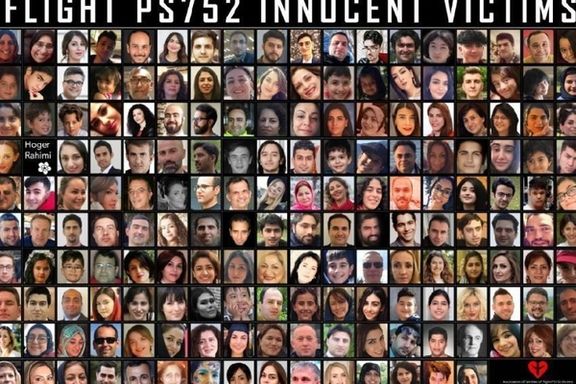The victims families asked the courts to seize Iranian state property and bank assets held on Canadian soil to cover millions of dollars in unpaid compensation.
The passenger plane was shot down over the skies of Tehran with two surface-to-air missiles by Iran’s Islamic Revolutionary Guard Corps (IRGC) on January 8, 2020 - killing everyone on board.
176 people were killed, including 55 Canadians, 30 permanent residents and many others with close ties to Canada.
On December 31, 2021, six family members obtained a default judgment from an Ontario court against Iran for $107 million plus interest and costs. They had filed a civil lawsuit against Iran and senior officials they believe were to blame for the incident.
The family members of the victims include Mehrzad Zarei, Shahin Moghaddam, Ali Gorji and several anonymous plaintiffs.
The Association of Families of Flight PS752 told Iran International they are not part of the law suit, but several of the PS752 victims families are. The Association has been formed to pursue formal international condemnation of the Islamic Republic for shooting down the Ukrainian airliner, then hiding the truth for three days, and eventually barring an international investigation.
The plaintiffs in the $107 million judgement took measures to try and enforce the ruling against the properties and bank accounts of Iran in Canada.
But an Ontario judge dismissed the motion, claiming the Iranian property was protected by diplomatic immunity under Canada law.
On Thursday, that decision was upheld on appeal.
In 2021, the Ontario Superior Court of Justice ruled that the Islamic Republic of Iran intentionally shot down the passenger plane.
At the time, the government of Canada also agreed that Iran was responsible for the shooting down the airliner, but also argued in Ontario Court that the courts do not have the power to seize Iranian assets.
The courts concluded that Iranian property is protected by diplomatic immunity under Canadian law.
Iran has stonewalled an multilateral international effort to reach an agreement to resolve the overall issue and satisfy the families of victims. It insists that the firing of anti-air missiles were the result of human error by a military missile operator. However, the incident took place on January 8, 2020, hours after Iran had fired missiles at US bases in Iraq and was expecting retaliation. Despite the tense military situation, it refused to close the airspace over Tehran and allowed civilian planes to take off.








